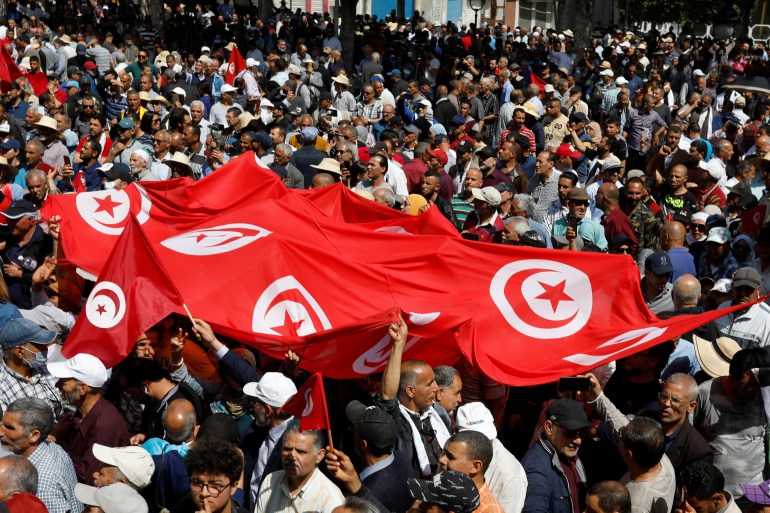The Tunisian General Labor Union (the largest trade union in the country) announced that the strike expected tomorrow, Thursday in the public sector, will include airports and seaports, while the government said it seeks to avoid it.
On the other hand, opposition forces called for a demonstration next Sunday against the policies of President Kais Saied.
In a statement published today, Wednesday, the Labor Union said that the current government insists on the same approach as previous governments in denying workers' rights and holding them responsible for the consequences of its choices that lead to undermining the gains and reversing the agreements, as he put it.
He added that he has been subjected to an unprecedented campaign of distortion and defamation since the announcement of the decision to strike in the public sector, which he will implement tomorrow.
The Tunisian General Labor Union also said that the decisions that the government intends to take during the day of the strike are illegal and unconstitutional, and by this he was referring to what is known in Tunisia as “forcement,” a legal mechanism that allows the government to force employees to work permanently in the event of a strike.
In this context, the spokesman for the trade union organization, Sami Al-Tahri, confirmed in statements to a local radio that the goals of the strike are social and not political, noting that the union has threatened a general strike in the public sector since last March, and since then has left the door open for the government to negotiate, but it was not serious. , as he put it.
For his part, the official in the Labor Union, Wajih al-Zaidi, said that the general strike called by the union will include, starting from midnight tonight, all Tunisian airports, and all international and domestic flights will be completely suspended tomorrow, adding that the strike will include all public transport institutions and will stop cruises. .
The union's executive office had announced that the strike would include 159 public institutions in various sectors.
Prior to that, the Tunisian Labor Union confirmed that it would not accept the agreement that the Tunisian government is seeking to reach with the International Monetary Fund to borrow about $4 billion in return for implementing a set of painful reforms, including reducing the wages of public sector employees and reducing government support.
government response
On the other hand, Tunisian government spokesman Nasr El-Din Al-Nusabi said that the government still believes in the possibility of avoiding the strike, which the Tunisian Labor Union decided to implement tomorrow, Thursday, in various public sector institutions.
Al-Nusabi added, in statements to Tunisian state radio, that the government is making efforts to hold a dialogue session with the union party today in order to reach solutions to union demands, in order to spare the country the negative repercussions of this strike, as he put it.
The director of Al Jazeera's office in Tunisia, Lotfi Hajji, said that there is anticipation for the possibility of holding a meeting between representatives of the Labor Union and the government this evening, to bridge the views between the two parties.
The labor union had decided to go on strike in the public sector after several negotiations with the government party failed.
The government says that the demands made by the union entail a financial cost of nearly one billion dinars (more than 300 million dollars).
A demonstration took place in mid-May in the Tunisian capital to denounce the policies of President Said (Reuters)
Invitation to demonstrate
Meanwhile, opposition forces affiliated with the National Salvation Front called for a demonstration next Sunday against the policies of President Qais Saeed.
In a statement published today, Wednesday, the Ennahda movement urged its supporters to participate in the demonstration, and the Dignity Coalition Party called on its supporters to participate in these protests.
The Ennahda movement said that the demonstration came as a victory for the values of freedom and "a defense of democratic gains from the dangers of the absurd dismantling practiced by the authority of the July 25 coup."
She added that this move also comes in support of the independent judiciary, and a rejection of what she described as the play of dialogue and the "deceptive referendum", in reference to the referendum scheduled for next July 25 on a new constitution prepared by a committee appointed by President Kais Saied.
The Ennahda Movement and other parties opposed to Saied announced that they would boycott the constitutional referendum.

